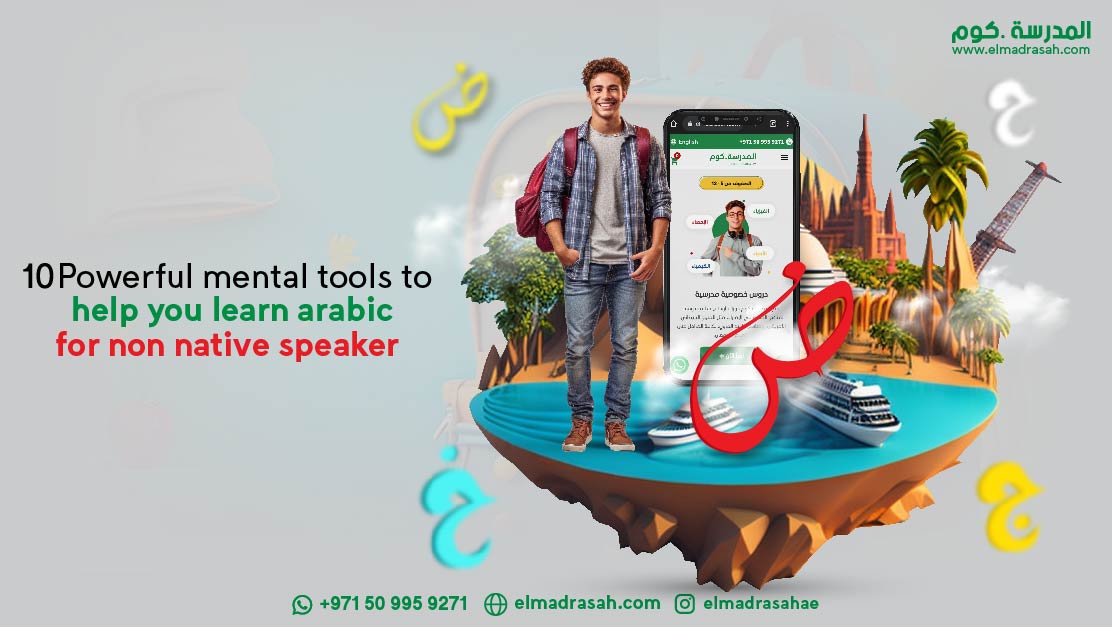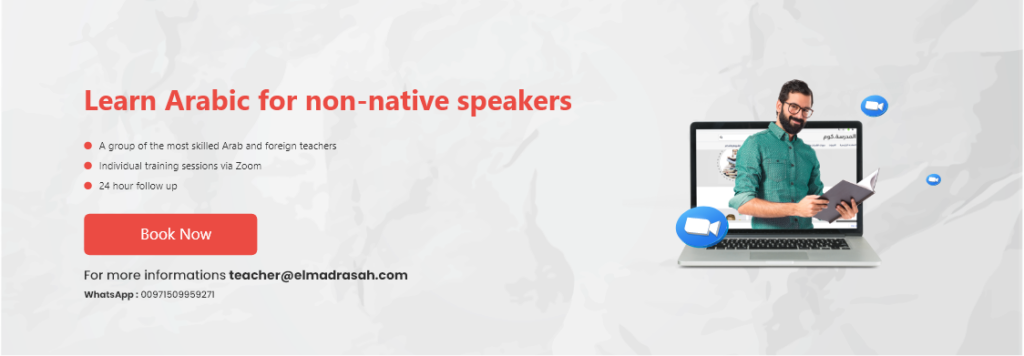
Learn Arabic, online or any other language, demands you to be aware of the most powerful mental tools and tricks, to shorten the way in the learning process. As we believe in active learning approaches, and advanced learn Arabic online methods, we give you useful hints in this article to encourage you for a new learning experience.
One to one online classes
The one to one online course helps you to be in direct contact with the source of language. The key word in learn Arabic online is persistence and practice. By the time your brain acquires the benefits of being a bilingual dual brain! Many researches have shown that a bilingual brain is less susceptible to getting affected by Alzheimer’s.
Imagine you have a mate to practice with him daily life language! Not only that but with a 24/7 follow-up, and the full access to learning data, flexibility in setting class appointments according to your schedule, the advantage of taking evaluation quizzes, and the eligibility to enter a certified test after our preparation courses!
Hard to find that? Not after now! Elmadrasah.com, empowers everyone who wants to learn Arabic online, with its authentic teaching methods, and the most professional tutors, experienced in mentoring non-native speakers!
You don’t have to waste your time in fatigue searching for online Arabic courses, just contact us, and we will inform you with all you need to know and more
Set your goal of learn Arabic online
If you don’t have a strong reason to learn Arabic online, you won’t be able to keep your enthusiasm to learn Arabic language in the long term.
Wanting to impress English speakers with your Arabic is not a good reason; your desire to communicate with an Arab person in their own language is another thing entirely. Regardless of your reason, the time you decide to learn Arabic language, it is important that you know why to learn it.
Go deeper into the language
You promised yourself to learn, but what to do? Is there a proper way to learn? Our mentors in elmadarsah.com, recommend studying in depth: No matter what learning tools you use, it’s important to practice your new language every day.
You will need to absorb as much of the language as possible right from the start.If you really learned something new, try to use it all the time.
Try to talk to yourself only in the Arabic language. Mastering a language definitely comes with practice, writing an email, talking to yourself, listening to the music, listening to the radio, immersing yourself with a new language culture.
Remember that the best possible outcome of speaking a language is for people to talk to you. Being able to have a simple conversation is a great reward in and of itself. Getting this early in the language will make it easier for you to maintain your practice of the language and motivate you to learn.
you can read more about: full comparison between online and offline learning.
Build a connection with the Arabic language
If you study the objective from the beginning, you will be less likely to get lost in the textbooks. Talking to people will preserve the learning process that concerns you.
You learn a language to be able to use it, you won’t speak it yourself. The creative side is really being able to make the language you learn more useful.
Generally, sit down every day writing songs, generally talk to people, use it when you travel abroad. You don’t have to travel abroad. You can go to an Arabic restaurant on the road and order in Arabic.
Enjoy the language
Use your new language anyway. Think of some funny ways to practice your new language. Present a play with a friend. Draw a comic strip. Write a poem. Or talk to anyone you can talk to. If you can’t find a way to enjoy your new language, you almost haven’t followed the previous tool. By using this method, you will build the concept of fun to learn, and being more persuasive about learn Arabic is not that hard!
Act like a child
Try to learn the way children do, the idea that children learn better than adults is a myth and not true.
New research could find a direct link between age and ability to learn. The secret of learning quickly in a child may be due to simple childish situations, for example, a lack of self-awareness, a desire to play with language and a willingness to make mistakes.
We learn to make mistakes, like children, we are expected to make mistakes, but for adults mistakes are forbidden.
Think how an adult is more likely to say “I can’t” than “I haven’t learned that yet” (I can’t swim – I can’t drive – I can’t speak Spanish) – to see you as a failure of social taboos that kids don’t care about. When it comes to the command to learn a language, acknowledging that you know nothing (and are convinced of it) is the key to growing up learning.
Step out of your comfort zone
A willingness to make mistakes means being ready to put yourself in awkward situations. It can be intimidating, but it’s the only way to improve. No matter how much you’ve learned, you’ll never speak a language without going out there: Talk to strangers in the language, ask about directions, order food, try to tell a joke.
At first, you want to learn the hard stuff: maybe the pronunciation, maybe the grammar and the syntax, or you don’t understand the sayings, but I think the most important thing is to develop that feeling. Every native speaker has that feeling in their own language, so you acquire a mother tongue.
you can read more about: Why is learn Arabic for non-Arabic speakers worth the time?
Listen
You have to learn to listen before you can speak, every language sounds strange the first time you hear it, but by exposing yourself more to the language you will be more familiar and easier to talk to.
“We are able to say anything, because we don’t have to. For example, there is no role in learn arabic. When we try to learn arabic there will be difficult words for us like (فوضى).
The best way to master it is to listen constantly, to listen to it or to imagine how it is supposed to sound, because for every sound there is a specific part of the mouth and throat that we use in order to make that sound.
Watch people talks
Different languages have different demands on your tongue, lips, and throat. Pronunciation is just as physical as it is mental:
“As a way – it might seem a little strange -To look at someone as they say the words that use that sound and then try to imitate that sound as much as possible, believe me, that might sound hard at first, but you can, it’s actually a very easy thing, you just need to practice it.
If you cannot watch and imitate the language of a real person, watching foreign-language films and television is a good alternative.
you can read more about: why learn Arabic in Dubai?
Speak to yourself
When you don’t have anyone to speak with, it’s not wrong to talk to yourself.
“It might sound really weird, but actually talking to yourself in a new language is great for training if you’re not always able to use it.”
That way, you can memorise new words and phrases well in your mind and build your confidence the next time you talk to someone.
The conclusion about learning a new language process, is that you don’t have to be tough on yourself, or so firm about it! Just enjoy it like an enthusiastic journey.
















